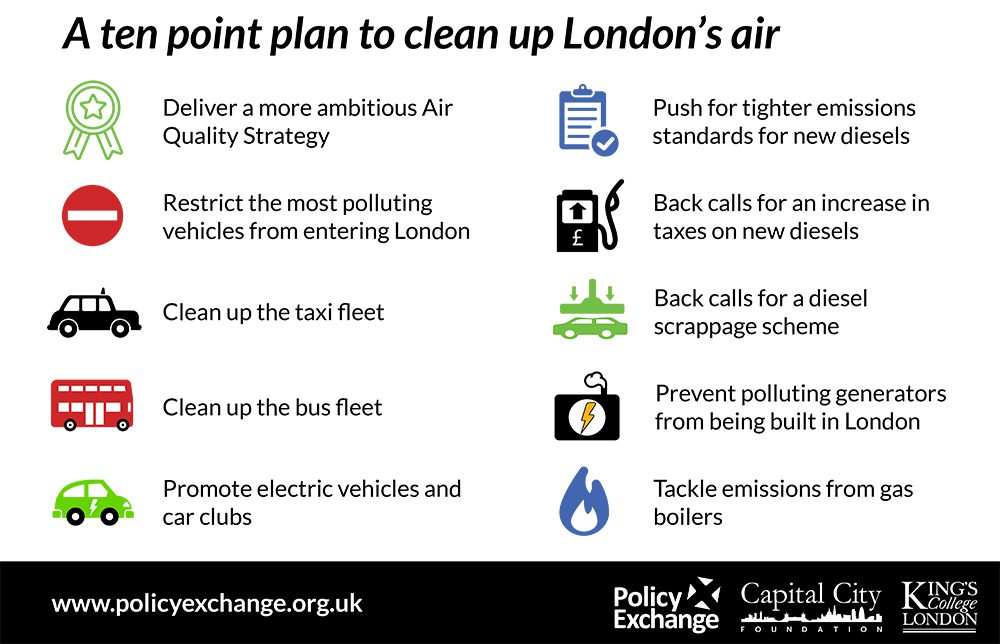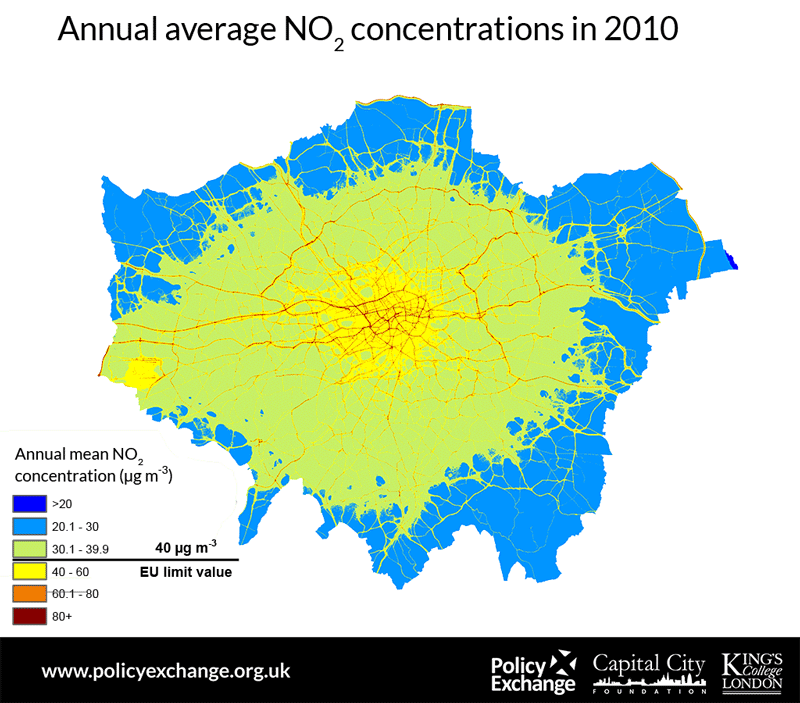London is facing an air pollution crisis. Our recent report Up in the Air: Part 1 documented the fact that more than 12% of London’s total area exceeded legal and healthy limits for nitrogen dioxide (NO2) in 2010. This area contained a workplace population of 3.8 million people, as well as 979 schools attended by a quarter of London’s school population. It is estimated that if air pollution stays at current levels, it would reduce the average life expectancy across all Londoners born in 2010 by up to 2 years. Poorer parts of London are disproportionately affected. The European Court of Justice has ruled that the UK must put in place a plan to achieve air quality standards in the “shortest time possible”. In short, there is a legal and moral imperative to improve London’s air quality, and more needs to be done about it.
Today marks the publication of a new report, Up in the Air: Part 2, by Policy Exchange and King’s College London, which proposes a comprehensive package of measures to reduce emissions and improve air quality in London. It focuses on two main sectors – road transport and gas combustion – which together are responsible for the vast majority of pollution in London. Our policy recommendations seek to deliver air quality improvements as soon as possible, whilst at the same time avoiding penalising people and businesses, and giving sufficient time to adapt.
Air pollution is the most important environmental issue to Londoners, and is becoming a key election issue as the Mayoral race gathers pace. Polling released earlier this week suggests that London parents see air pollution as the biggest health risk to Londoners, with 68% of parents saying they are worried about their children breathing in dirty air.
We call on all of the Mayoral candidates to support our ten point plan to clean up London’s air (details of our proposals are provided in our report published today):
 1. Deliver a more ambitious Air Quality Strategy. Current and planned policies will not deliver compliance with air quality limits in London until at least 2030. Further action is required to clean up London’s air, and the Mayor of London will need to play a strong leadership role on this issue to accelerate change. Tackling air pollution will require a combination of policies at London, UK and European level.
1. Deliver a more ambitious Air Quality Strategy. Current and planned policies will not deliver compliance with air quality limits in London until at least 2030. Further action is required to clean up London’s air, and the Mayor of London will need to play a strong leadership role on this issue to accelerate change. Tackling air pollution will require a combination of policies at London, UK and European level.
2. Restrict the most polluting vehicles from entering London. The emissions standards in the existing Low Emission Zone and planned Ultra Low Emission Zone need to be tightened in the future in order to restrict the most polluting vehicles. We propose tighter standards for buses, coaches and HGVs in the London-wide Low Emission Zone by no later than 2023, and tighter standards for diesel cars in the Ultra Low Emission Zone by 2025.
3. Clean up the taxi fleet. In the long termLondon is moving towards“Zero Emission Capable” taxis and minicabs, but in the meantime the Mayor should focus on cleaning up the existing fleet. We propose that all pre-Euro 6 taxis should be retired from the fleet by 2025, and alongside this TfL should encourage the retrofit or conversion of taxis to LPG. The Mayor must also take immediate action to prevent pre-Euro 6 cars from registering as minicabs.
4. Clean up the bus fleet. Transport for London needs to complete the rollout of low emission buses across London. We propose that all buses should be a minimum of Euro VI by 2020 in Central London and across the whole of London by no later than 2023. The most polluted roads such as Oxford Street should be declared ‘clean bus corridors’, using only the cleanest buses available and rerouting some services.
5.Promote electric vehicles and car clubs. London is leading the way in the use of electric vehicles, but the number of electric vehicles and charging points is still relatively low. The Mayor of London should encourage the use of electric vehicles and car clubs. This will require the rollout of a competitive pan-London electric charging network (or networks).
6. Push for tighter emissions standards for new diesels.The primary cause of the air pollution crisis is the failure of emission standards for diesel vehicles. Current diesel car standards simply do not go far enough and need to be tightened further, based on real-world emissions tests.
7. Back calls for an increase in taxes on new diesel cars.Fiscal incentives such as Vehicle Excise Duty (road tax) and Company Car Tax have driven the uptake of diesels over the last 15 years. These tax advantages need to be removed to reflect the local pollution associated with diesels. These policy changes need to be designed carefully to influence new purchases without penalising existing diesel drivers.
8. Back calls for a diesel scrappage scheme.The Mayor of London should support calls for a national diesel scrappage scheme which provides grants to take older diesel cars and vans off the road and replace them with lower emission vehicles (e.g. petrol, hybrids, electric, LPG).
9. Prevent polluting generators from being built in London.There is a risk that the growth of decentralised power stations, such as diesel, gas and biomass engines, could undermine efforts to improve air quality in London. The Mayor must ensure that there are adequate safeguards in place to prevent inappropriate developments, and work with central government to ensure energy policies do not create air quality issues in London.
10. Tackle emissions from gas boilers. Gas combustion is the second largest source of NOx emission after road transport. Creating a boiler cashback scheme is a cost effective was to drive the replacement of old polluting boilers.
Our modelling suggests that the combination of our proposed policies will deliver compliance with NO2 limits across 99.9% of London’s area by 2025 – representing a massive improvement in air quality compared to the status quo (see map below). We have suggested further targeted actions to achieve compliance on the remaining roads in London, in particular targeting further reductions in bus and freight related emissions.
The reduction in air pollution will lead to a significant improvement in health outcomes: we estimate that the policies will increase the life expectancy of the average Londoner born in 2025 by over one month, leading to economic benefits valued at £600 million per year.


